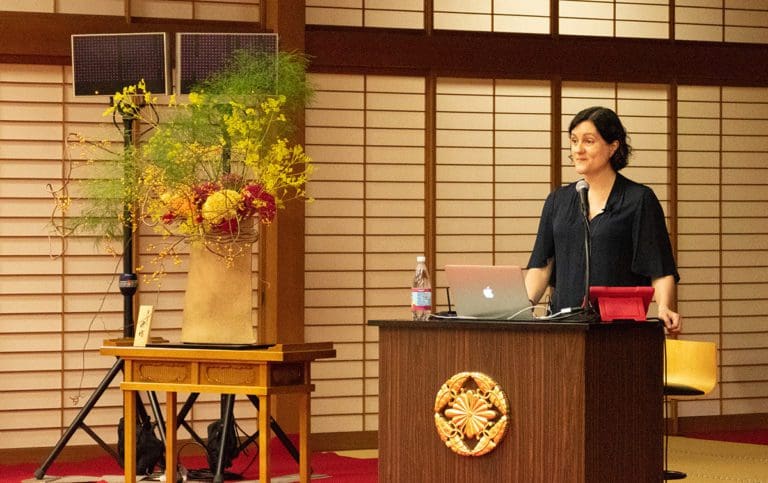
What role do context and history play in influencing meditation practice and outcomes? How can the contemplative practices of one culture be effectively studied and practiced by another? More than 75 scientists, scholars, contemplatives, and artists from 11 countries recently convened in Kyoto, Japan to explore these and related questions at Mind & Life’s inaugural
International Research Institute (IRI).
Held within the serene setting of Myōshin-ji, a 14th century Zen temple complex, the five-day event was modeled on Mind & Life’s signature Summer Research Institute (SRI), now in its 15th year. The conference theme, “Contemplative Practice in Context: Culture, History, and Science,” framed presentations and discussion on topics ranging from the centrality of narrative to human experience to the historic influence of Zen on the arts in Japan.
“Mindfulness today is viewed as very one size fits all,” said Gaelle Desbordes, Ph.D., Co-chair of the event’s planning committee, in explaining the need for a deeper inquiry into the social and cultural factors that shape contemplative practice and research. “Because Japan is typically Buddhist, the IRI offered a great opportunity to speak about the critical role of context, while exploring the more scientific, secular aspects of contemplative studies.”

“Because Japan is typically Buddhist, the IRI offered a great opportunity to speak about the critical role of context, while exploring the more scientific, secular aspects of contemplative studies.”
-Gaelle Desbordes, Ph.D.
Opening plenary speaker Laurence Kirmayer, M.D.,an expert in transcultural psychology, spoke to the importance of pursuing an ecosocial view of the mind. “Rather than just studying the underlying mechanisms of meditative practice, we need to be looking equally at social processes and ways in which people implement and engage in practices in their everyday lives. Otherwise,” he cautioned, “we’ll be left with an idealized and ideological picture of what’s going on.”
With attendees seated on traditional tatami mats, sessions offered rich insights into Japan’s contemplative and intellectual culture, including the practice of Naikan, a method of self-reflection rooted in the cultivation of gratitude; the philosophy of the Kyoto School and the concept of nothingness from which the unity of consciousness is established; and time-honored traditions such as the tea ceremony and ikebana, the art of flower arranging.
For Hiroe Hu, who grew up in Kobe, Japan, the Kyoto convening reinforced the inherent mindfulness in Japanese culture. Now studying medicine at Touro University in California, Hu describes being ‘blown away’ by the ikebana presentation, with its emphasis on impermanence and appreciating beauty, even that of a withered flower. “Japanese culture has a non-preference for life or death,” she explains. “In the West, people are more preoccupied with staying young and living longer.”
The notion of mindful living as embedded in culture also struck Sara Belton, Ph.D., Assistant Professor at the University of Saskatchewan. “Being able to see how many parts of Japanese culture were overtly and subtly influenced by Buddhism over the years had a lasting impact on me,” shares Belton. “It gave a whole new meaning to [the concept of] living practice.”
For Belton and others, the Kyoto event underscored the potential risks of adopting a practice or tradition from another culture without proper guidance. To mitigate against such risks, she emphasizes the importance of “working with people from that culture to fully understand and co-curate experiences that help to ensure there is low risk of appropriation, imperialism, or misinterpretation.”
Other IRI attendees, like Yuuta Kawasaki, a student at Ritsumeikan University, spoke to the value of being part of an international learning community. Kawasaki was able to place his university’s contemplative education curriculum within a larger global context. As a result, he and his university colleagues now plan to connect with scholars in other parts of the world to pursue joint research.
Still others commended the IRI’s inter-disciplinary and inter-generational design, and the bridging of theory and practice. “A distinctive strength of the conference was bringing together scholars from a wide range of disciplines—history, philosophy, neuroscience, and psychology—to share research findings,” remarked Clark Chilson, Associate Professor of Religious Studies at the University of Pittsburgh.
“Mind & Life’s Kyoto IRI was one of the most inspiring, transformative, and intellectually stimulating conferences I have ever attended.”
-Srinivas Reddy, Ph.D.
Citing the combination of rigorous academic scholarship and scientific inquiry with meditation and yoga practice, Srinivas Reddy, a Visiting Assistant Professor in Religious and Contemplative Studies at Brown University, said the conference was one of the “most inspiring, transformative, and intellectually stimulating conferences” he had ever attended.
As Mind & Life continues to expand its offerings globally, plans are underway for a 2020 International Research Institute in Chile. For Hiroe Hu, the next IRI can’t come soon enough. “There are so many cultures I’d like to learn about through the lens of contemplative studies,” she says. “I’m excited to see what will come to life in the next decade through this community.”


